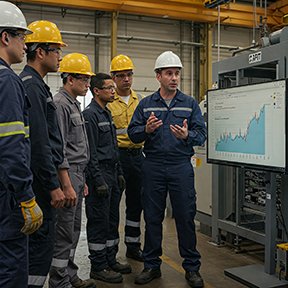Published: June 01, 2015 | Updated: September 18, 2025
Published: June 01, 2015 | Updated: September 18, 2025
Unlocking Peak Performance: Essential Metrics for Measuring Company Effectiveness
Navigating the Landscape of Operational Measurement
 The quest to understand and improve a company's performance is a continuous journey for business owners and managers. While debates may swirl around the ultimate methods of evaluation, within the realm of operations management, a set of fundamental metrics provides a clear lens through which to assess current standing and chart a course for future success. Ideally, this positions the organization favorably against its competitors. Read on to unlock peak performance and a discussion about essential metrics for measuring company effectiveness.
The quest to understand and improve a company's performance is a continuous journey for business owners and managers. While debates may swirl around the ultimate methods of evaluation, within the realm of operations management, a set of fundamental metrics provides a clear lens through which to assess current standing and chart a course for future success. Ideally, this positions the organization favorably against its competitors. Read on to unlock peak performance and a discussion about essential metrics for measuring company effectiveness.
Operations management boasts a rich and evolving history, marked by intriguing theories, guiding philosophies, and practical methodologies. These approaches help refine the effectiveness of virtually every type of operation throughout the annals of business. While individual managers may champion distinct strategies, two overarching metrics consistently emerge as pivotal in the evaluation of performance: efficiency and effectiveness. Not just buzzwords; they represent distinct but interconnected facets of operational success.
Deconstructing Effectiveness: A Multifaceted View
Effectiveness and efficiency serve as broad umbrellas, each encompassing a range of more granular sub-metrics. When scrutinizing effectiveness, operations managers typically focus on six key dimensions, each offering a unique perspective on how well the company meets its objectives and stakeholder expectations.
Determining the right price for a product or service is a complex equation that extends beyond simple market demand. While the marketing department often holds significant sway in final pricing decisions, operations managers must consider a wider array of cost factors. These include the ongoing expenses associated with:
- Maintaining equipment
- The cost incurred during the usage of resources.
- Any anticipated costs related to future upgrades or enhancements
- The financial implications of disposal at the end of a product's lifecycle
- The initial purchase price.
A holistic view of pricing ensures that the value proposition aligns with the total cost of ownership and operation.
When we discuss quality, we don't focus merely on the absence of defects. It fundamentally relates to a product's adherence to specified standards and compliance with established benchmarks. These standards can originate from various sources, including:
- Governing agencies that set industry regulations.
- Internal engineering specifications that define performance parameters
- Other recognized bodies that establish quality benchmarks relevant to the specific goods being produced.
Consistent quality builds trust, fosters customer loyalty, and reduces the costs associated with rework and returns.
The Agility of Time: Responsiveness and Speed
Time as a metric assesses the speed and responsiveness of operational processes. This encompasses various aspects, from the time it takes to bring a product to market to the speed of order fulfillment and the efficiency of response to customer inquiries. Minimizing lead times, accelerating production cycles, and ensuring timely delivery keep your company possessing a competitive edge and satisfying customer expectations in today's fast-paced environment.
The Power of Flexibility: Adapting to Change
Flexibility examines an operation's or system's capacity to adapt and respond effectively to changes and external influences. Consider a business operating in a region typically free from severe weather events. If an unexpected storm occurs, a manager will want to evaluate how well the operational systems can cope. Can the production line withstand a thunderstorm? What about a hurricane? Is the overall output significantly affected by this unforeseen external factor?
Beyond weather-related disruptions, other facets include:
- Machine flexibility (the ability of equipment to perform different tasks).
- Operation flexibility (the ability to use different methods to achieve the same outcome).
- Production flexibility (the ability to change the product mix or volume).
- Marketing flexibility (the ability to adapt marketing strategies to changing market conditions).
The Cornerstone of Availability: Ensuring Operational Uptime
Availability focuses on the frequency with which a machine or an entire operation is capable of functioning as intended. Closely linked to this comes the concept of reliability, which represents the probability that a system will perform without failure for a specified period under given conditions. A more reliable system inherently translates to greater availability. Consistent availability means meeting production targets and maintaining a steady flow of goods or services.
Ecological Soundness: Responsibility and Sustainability
This evaluates the environmental and biological consequences of an operational system. It prompts critical questions about potential harm to the local environment and necessitates strategies to mitigate or prevent such impacts. This metric also considers the environmental risks associated with the system, even those that might only manifest during a breakdown or system failure. A commitment to ecological soundness not only aligns with growing environmental awareness and regulations but also enhances a company's reputation and long-term sustainability.
Discover how streamlined maintenance processes can elevate production. Learn more.
Understanding Efficiency: The Productivity Imperative
Efficiency metrics, while distinct from effectiveness, assess operational health. Typically, these metrics center on the concept of productivity. This involves analyzing the quantity of units produced, identifying potential bottlenecks or limitations in the production process, and exploring strategies to enhance overall output. Efficiency refers to doing things right, maximizing output with minimal input of resources such as time, labor, and materials.
 A Computerized Maintenance Management System (CMMS) emerges as a valuable asset in bolstering both effectiveness and efficiency metrics. This technology facilitates the systematic tracking of maintenance activities. Industries can proactively address potential equipment issues before they lead to downtime or reduced performance. By diligently managing preventative and proactive maintenance schedules, a CMMS helps ensure that equipment operates at its peak capability, directly contributing to enhanced productivity and overall efficiency.
A Computerized Maintenance Management System (CMMS) emerges as a valuable asset in bolstering both effectiveness and efficiency metrics. This technology facilitates the systematic tracking of maintenance activities. Industries can proactively address potential equipment issues before they lead to downtime or reduced performance. By diligently managing preventative and proactive maintenance schedules, a CMMS helps ensure that equipment operates at its peak capability, directly contributing to enhanced productivity and overall efficiency.
Furthermore, the fundamental function of a CMMS in tracking maintenance directly contributes to increased availability and reliability of equipment and the entire operational system–key effectiveness metrics discussed earlier. By minimizing unexpected breakdowns and ensuring consistent equipment performance, a CMMS plays a crucial role in maintaining operational continuity and achieving higher levels of effectiveness.
Beyond the Numbers: Cultivating a Culture of Continuous Improvement
While these metrics provide a valuable framework for assessing a company's operational standing, true and lasting improvement transcends mere measurement. The act of tracking and analyzing these indicators should serve as a catalyst for fostering a culture of continuous improvement throughout the organization.
This involves engaging employees at all levels in the process, encouraging feedback, and empowering teams to identify and implement solutions that drive enhanced performance. By embedding a mindset of ongoing refinement, companies can move beyond simply monitoring their effectiveness and actively shaping a future of sustained success and innovation. The insights gained from these metrics become not just data points, but actionable intelligence that fuels strategic decision-making and propels the company toward its long-term goals.
FAQs
What are the key metrics for measuring company effectiveness?
Effectiveness is measured through quality, time, flexibility, availability, price, and ecological impact.
How do efficiency metrics differ from effectiveness metrics?
Efficiency focuses on productivity, maximizing output with minimal input, while effectiveness measures how well objectives are achieved.
How does MAPCON CMMS help improve operational metrics?
MAPCON CMMS tracks maintenance activities, increases equipment availability, reduces downtime, and supports proactive performance management.
Why is availability important for operations?
Availability ensures machines and systems function consistently, supporting production targets and operational continuity.
How does flexibility contribute to operational success?
Flexibility allows systems to adapt to changes, such as shifts in production, marketing, or unexpected external events.
Why is ecological soundness included as a performance metric?
It evaluates environmental impact, promotes sustainability, and enhances a company’s reputation and long-term viability.
MAPCON | 800-922-4336
MAPCON CMMS software empowers you to plan and execute PM tasks flawlessly, thanks to its wealth of features and customizable options. Want to see it for yourself? Click the button below to get your FREE 30-day trial of MAPCON!
Try It FREE!